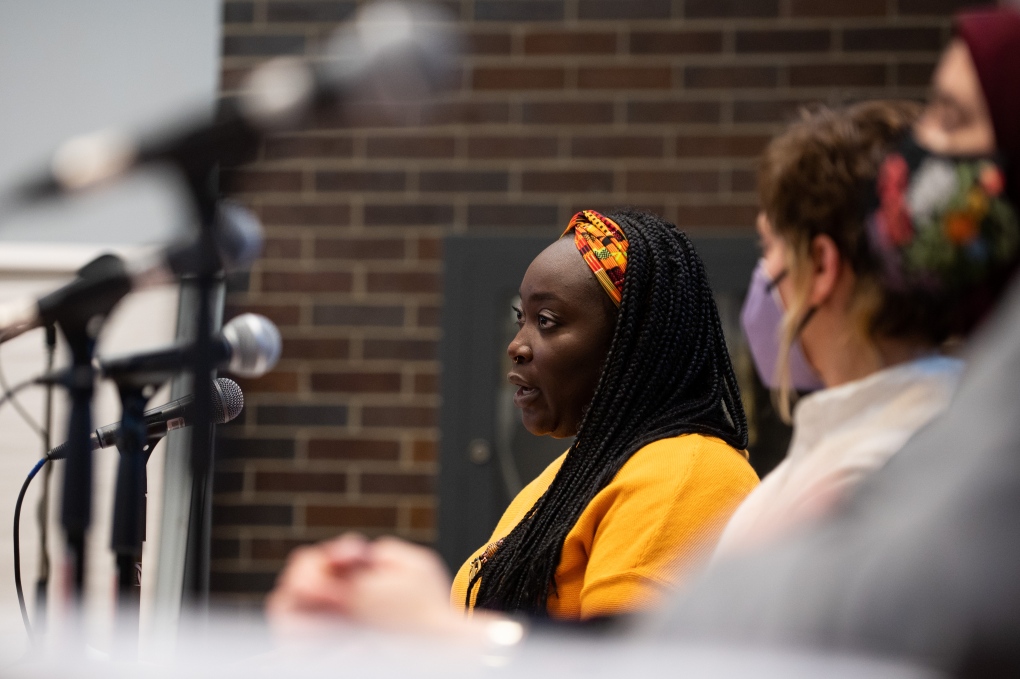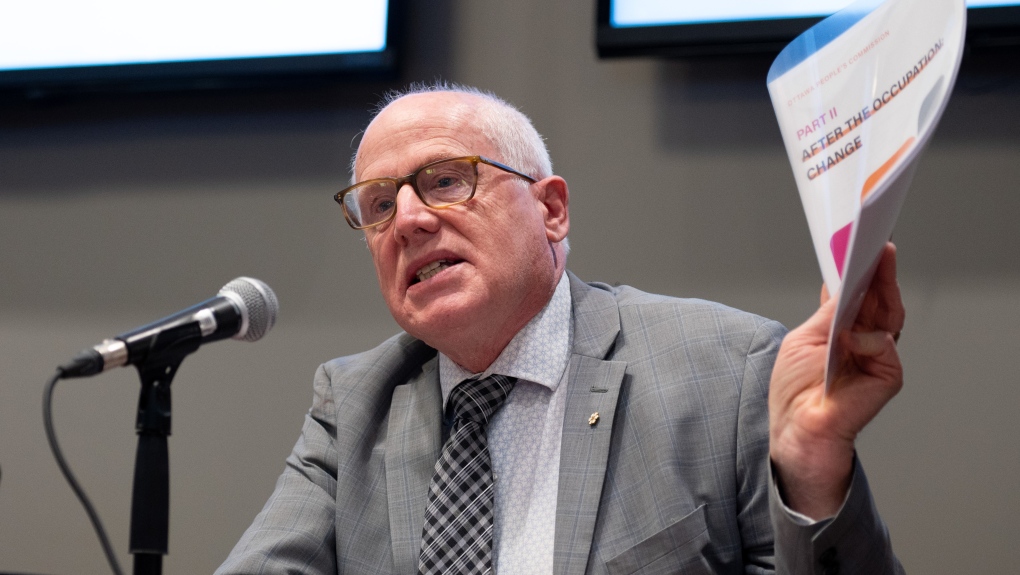'Freedom Convoy' victims deserve apology, compensation, people's commission recommends
Another report detailing the effects that the 2022 "Freedom Convoy" had on the residents of Ottawa has been released, making recommendations to various levels of government to prevent similar incidents and improve trust between residents and officials.
The Ottawa People's Commission on the Convoy Occupation (OPC), which describes itself as a grassroots effort to promote healing and justice after the convoy protest in January and February 2022, has already released one report into the impact of the protest that occupied downtown Ottawa last year. The OPC is a program of Centretown Community Health Centre.
- Download our app to get local alerts to your device
- Get the latest local updates right to your inbox
The first report accused all three levels of government of failing to uphold the human rights of people who live and work in downtown Ottawa.
The second report includes 25 recommendations for government leaders, ranging from local initiatives in Ottawa to broad-reaching recommendations to all three levels of government.
"While there are those who suggest the community should 'move on' and 'get over it', OPC believes it is essential and urgent that the City of Ottawa and other governments provide a substantive — indeed transformative — response, acknowledging the failures, redressing the harms and taking actions that build assurance that the shambolic response to the convoy occupation will never be repeated," the report says.
The 25 recommendations made in the report fall under eight categories: earn trust; uphold the rights of Indigenous peoples; protect human rights; prioritize support for disadvantaged and vulnerable groups; keep the community safe; strengthen emergency response; address hate, build community and advocate inclusion; and ensure accurate follow-up.
"Having both former and also current city councilors involved, I think is indicative that people really care and really want to see some changes because the city not only dealt with this on our own here within the borders of Ottawa, but this rippled across the country and it rippled internationally," said Debbie Owusu-Akyeeah, one of the members of the OPC. "And I think if there are decision makers who don't care, they absolutely should. And I think again, this report is an important documentation as to why."
The report also includes a suggested timeline for its recommendations, ranging from June 30, 2023 to June 30, 2024.
 Ottawa People's Commission on the Convoy Occupation (OPC) Commissioner Debbie Owusu-Akyeeah speaks during a news conference following the release of the second part of the OPC report, titled "After the Occupation: Change", in Ottawa, on Tuesday, April 4, 2023. (Spencer Colby/THE CANADIAN PRESS)
Ottawa People's Commission on the Convoy Occupation (OPC) Commissioner Debbie Owusu-Akyeeah speaks during a news conference following the release of the second part of the OPC report, titled "After the Occupation: Change", in Ottawa, on Tuesday, April 4, 2023. (Spencer Colby/THE CANADIAN PRESS)
The recommendations range in focus and scope from calling on the city to host town hall meetings with downtown residents by the end of June to give officials a first-hand account of residents' experiences to asking for compensation for expenses, lost wages and income, business losses and other financial costs incurred as a result of the convoy occupation.
"The people realized there were unanswered questions. They very much realized that the communities viewpoint and perspective was not being sought, was not being incorporated into decision making, was not informing police actions. And that felt wrong," said Alex Neve, of the OPC.
Other recommendations include creating a human rights charter for the city, and for the municipal, provincial and federal governments to apologize for the harms the protest caused.
"The majority of recommendations are directed to City Hall, where dramatic, substantive change is urgently needed. Others relate to the Province and federal government, or require the cooperation of all three levels of government," the report states.
 Ottawa People's Commission on the Convoy Occupation (OPC) Commissioner Alex Neve speaks during a news conference following the release of the second part of the OPC report, titled "After the Occupation: Change", in Ottawa, on Tuesday, April 4, 2023. (Spencer Colby/THE CANADIAN PRESS)
Ottawa People's Commission on the Convoy Occupation (OPC) Commissioner Alex Neve speaks during a news conference following the release of the second part of the OPC report, titled "After the Occupation: Change", in Ottawa, on Tuesday, April 4, 2023. (Spencer Colby/THE CANADIAN PRESS)
"Some recommendations require immediate action. Others will take more time and more active engagement with residents, community organizations and agencies, and local business leaders to ensure the response meets the community’s diverse needs. In each instance, we have recommended a timeframe for follow up action."
Rebuilding trust in city institutions and the police service has been a stated goal of both Ottawa mayor Mark Sutcliffe and police chief Eric Stubbs.
The first report, titled "What We Heard", compiled the experiences of residents who live in downtown Ottawa. It heard from more than 200 people who endured the three-week long event, which began ostensibly as a protest against COVID-19 public health mandates and the federal Liberal government, but became entrenched as an occupation of downtown streets, as protesters blocked road, set up their own structures and supply chains, and refused to leave.
Jean Christie, a Centretown resident, described her experiences during the protest in 2022.
"To walk across that intersection, I felt like I was moving into somebody else's territory, you know," Christie said. "The honking vehicles were awful. The diesel fumes were awful. And there were a whole lot of places I just simply didn't go because it was too unpleasant. So my question was, how did it get to this before something happened? That was really my concern. How on earth did we get to this place?"
The Freedom Convoy protest in Ottawa inspired numerous similar vehicle-based protests across Canada and around the world in 2022, including at some Canada-U.S. border crossings, to denounce government-imposed mandates to protect the public health of citizens from the COVID-19 pandemic. It also led to the first-ever invocation of the Emergencies Act in Canadian history. A federal commission that examined the use of the act—something required by law when the emergency powers are invoked—found that the government met the threshold to use the Emergencies Act, though commissioner Paul Rouleau expressed his reluctance with the finding.
On Monday, federal court heard from the Canadian Civil Liberties Association and other groups and individuals, who argued that the Trudeau government lacked sound statutory grounds to invoke the emergency measures. The government has argued that the court case should not proceed because the powers are no longer in effect.
--With files from CTV News Ottawa's Dave Charbonneau.
Ottawa People’s Commission Part II - After The Occupation: Change
CTVNews.ca Top Stories

Poilievre writes to GG calling for House recall, confidence vote after Singh declares he's ready to bring Liberals down
Conservative Leader Pierre Poilievre has written to Gov. Gen. Mary Simon, imploring her to 'use your authority to inform the prime minister that he must' recall the House of Commons so a non-confidence vote can be held. This move comes in light of NDP Leader Jagmeet Singh publishing a letter stating his caucus 'will vote to bring this government down' sometime in 2025.
At least 2 dead and 60 hurt after a car drives into a German Christmas market in a suspected attack
A car plowed into a busy outdoor Christmas market in the eastern German city of Magdeburg on Friday, killing at least two people and injuring at least 60 others in what authorities suspect was an attack.
Judge sentences Quebecer convicted of triple murder who shows 'no remorse'
A Quebecer convicted in a triple murder on Montreal's South Shore has been sentenced to life in prison without chance of parole for 20 years in the second-degree death of Synthia Bussieres.
'I understand there's going to be a short runway,' new minister says after Trudeau shuffles cabinet
Prime Minister Justin Trudeau added eight Liberal MPs to his front bench and reassigned four ministers in a cabinet shuffle in Ottawa on Friday, but as soon as they were sworn-in, they faced questions about the political future of their government, and their leader.
Speeding drivers get holiday surprise from 'Officer Grinch'
Drivers in the Florida Keys who exceed the speed limit in school zones may run into a well-known gloomy green creature and get a surprising 'gift.'
Poilievre to Trump: 'Canada will never be the 51st state'
Conservative leader Pierre Poilievre is responding to U.S. president-elect Donald Trump’s ongoing suggestions that Canada become the 51st state, saying it will 'never happen.'
U.S. House approves funding bill and sends to Senate hours before government shutdown deadline
Hours to go before a midnight government shutdown, the House has approved a new plan from House Speaker Mike Johnson.
A new book about Chrystia Freeland just came out. Here's what we learned
A new book about Chrystia Freeland has just come out, after the publishing company sped up its release date by a few months. CTV News sifted through the book and pulled out some notable anecdotes, as well as insights about Freeland's relationship with the prime minister.
Kelly Clarkson's subtle yet satisfying message to anyone single this Christmas
The singer and daytime-talk show host released a fireside video to accompany her 2021 holiday album, “When Christmas Comes Around” that she dubbed, “When Christmas Comes Around…Again.

































